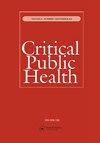重新思考与重塑“社会”:美国大学生的合作制片、批判教学法与心理健康
IF 2.3
3区 医学
Q2 PUBLIC, ENVIRONMENTAL & OCCUPATIONAL HEALTH
引用次数: 0
摘要
摘要本研究旨在探讨美国南部一所大学的学生如何概念化、理论化并试图影响“社会因素”在心理疾病和幸福感中所扮演的角色。利用研究合作生产的模式和批判教学法的原则,一个由10名大学生组成的小组(“学生研究人员”)与一名教师合作开展并开展了这项研究。结果突出了学生受访者(“学生对话者”)对“社会”进行理论化的三种方式。前两个——(1)通过“健康的社会决定因素”和(2)通过“新自由主义主体性”理论——为质疑权力等级制度提供了一个强有力的框架。然而,因为这些都不符合我们对为社会变革创造知识的兴趣,我们使用预示和推测的方法来探索社会的第三个概念,即(3)“创造世界的实践”。我们通过反思这个项目对教育者、学习者和研究人员寻求加深心理健康的社会知识和理论的相关性来结束。我们认为,借鉴批判性教育学原则的合作研究可以加强跨学科合作,并导致更细致、更具变革性和创新性的分析。致谢致谢致谢致谢致谢致谢致谢致谢致谢致谢致谢致谢致谢致谢致谢致谢致谢致谢致谢致谢致谢致谢致谢致谢致谢致谢致谢致谢致谢致谢致谢致谢致谢致谢致谢致谢致谢致谢致谢致谢致谢致谢致谢致谢致谢致谢致谢致谢致谢致谢致谢致谢致谢致谢致谢致谢致谢致谢致谢致谢致谢致谢致谢致谢致谢致谢致谢致谢致谢致谢致谢致谢致谢致谢致谢致谢致谢致谢致谢致谢致谢致谢致谢致谢致谢致谢致谢致谢致谢致谢致谢致谢致谢致谢致谢致谢致谢致谢致谢致谢致谢致谢致谢致谢致谢致谢致谢致谢致谢致谢致谢致谢致谢致谢致谢致谢致谢致谢没有你的洞察力和热情,这个项目是不可能完成的。我们也感谢在医学、健康和社会系系列研讨会上提供意见的教员。披露声明作者未报告潜在的利益冲突。我们使用术语“对话者”而不是“研究参与者”来强调在定性的开放式研究中知识创造的协作性和始终处于同一位置的性质(Simpson, Citation2011)。使用开放式方法,对话者被要求在性别、民族和种族方面自我认同:27人认为是女性,6人认为是男性;22人为非白人或有色人种,11人为白人,12人为国际学生,其中10人为非白人;其中9名学生是第一代或第二代大学生。虽然对话者没有被明确询问他们的心理健康状况,但大约一半的人报告说,他们在学习期间寻求过心理帮助,无论是在校内还是校外。33位对话者中有25位使用了这些附加问题。33位受访者中有11位回答了这些问题。领导这一运动的学生正在向大学管理层施压,要求重新命名卡尔霍恩大厅,以威廉·亨利·卡尔霍恩(1815-1865)的名字命名,他是纳什维尔的一位银匠和珠宝商,支持美利坚联盟国并拥有奴隶(芬克,Citation2019)。其他信息资金作者报告没有与本文所述工作相关的资金。本文章由计算机程序翻译,如有差异,请以英文原文为准。
Rethinking and remaking “the social”: co-production, critical pedagogy, and mental health among university students in the USA
ABSTRACTThis paper presents findings from a qualitative study exploring how students at a university in the southern USA conceptualize, theorize, and attempt to influence the role ‘social factors’ play in mental illness and well-being. Drawing on models of research co-production and principles of critical pedagogy, a group of 10 university students (‘student researchers’) worked with a faculty member to develop and conduct the study. The results highlight three ways in which the student interviewees (‘student interlocutors’) theorize ‘the social’. The first two – (1) via the ‘social determinants of health’ and (2) by means of theories on ‘neoliberal subjectivity’ – provide a powerful frame for interrogating hierarchical systems of power. However, because neither of these corresponds to our interest in producing knowledge for social change, we used prefigurative and speculative approaches to explore a third notion of the social, that of (3) ‘world-making practices’. We conclude by reflecting on the relevance of this project for educators, learners, and researchers seeking to deepen knowledge and theories of the social in mental health. We argue that co-produced research that draws from principles of critical pedagogy can enhance interdisciplinary collaboration and lead to more nuanced, transformative, and innovative analyses.KEYWORDS: Social context of mental healthco-productioncritical pedagogystudent mental health AcknowledgementWe would like to thank the other student researchers who participated in early phases of this research: Katherine Carlsen, Andriana Johnson, Francis Lee, Victoria Mityul, Payton Robinette, and Michael West. This project would not have been possible without your insights and enthusiasm. We are also grateful to comments provided by members of faculty at the Department of Medicine, Health, and Society seminar series.Disclosure statementNo potential conflict of interest was reported by the author(s).Notes1. We use the term ‘interlocutor’ rather than ‘study participants’ to emphasize the collaborative and always-situated nature of knowledge creation in qualitative, open-ended research (Simpson, Citation2011).2. Using open-ended methods, interlocutors were asked to self-identify in terms of gender, ethnicity, and race: 27 identified as women, 6 as men; 22 as non-white or persons of color, 11 as white, and 12 as international students, 10 of whom identified as non-white; and nine students were either first- or second-generation university attendees. While interlocutors were not explicitly asked about their mental health, approximately half of them reported having sought psychological help during their studies, either on or off campus.3. These additional questions were used with 25 of our 33 interlocutors.4. 11 of our 33 interlocutors answered these questions.5. Students leading this movement are pressuring the university administration to rename Calhoun Hall, named after William Henry Calhoun (1815–1865), a Nashville silversmith and jeweler, who supported the Confederate States of America and owned slaves (Fink, Citation2019).Additional informationFundingThe author(s) reported there is no funding associated with the work featured in this article.
求助全文
通过发布文献求助,成功后即可免费获取论文全文。
去求助
来源期刊

Critical Public Health
Multiple-
CiteScore
5.90
自引率
7.10%
发文量
36
期刊介绍:
Critical Public Health (CPH) is a respected peer-review journal for researchers and practitioners working in public health, health promotion and related fields. It brings together international scholarship to provide critical analyses of theory and practice, reviews of literature and explorations of new ways of working. The journal publishes high quality work that is open and critical in perspective and which reports on current research and debates in the field. CPH encourages an interdisciplinary focus and features innovative analyses. It is committed to exploring and debating issues of equity and social justice; in particular, issues of sexism, racism and other forms of oppression.
 求助内容:
求助内容: 应助结果提醒方式:
应助结果提醒方式:


